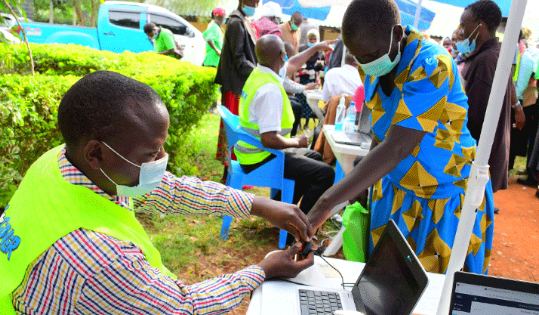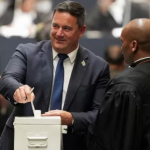South African President Cyril Ramaphosa’s office has announced that he will sign a controversial education bill into law, which has sparked the first significant discord in his unity government. The Democratic Alliance (DA), the second-largest party in the coalition, warned that this move could jeopardize their coalition agreement.
In response to the DA’s statement, Ramaphosa’s spokesperson urged restraint, emphasizing that a legislative dispute should not threaten the stability of the government. The DA had formed a coalition with Ramaphosa’s African National Congress (ANC) and other smaller parties after the ANC lost its parliamentary majority in the May elections, despite significant ideological differences.
DA leader John Steenhuisen criticized the decision, stating that passing the bill would breach the agreements that underpin the government of national unity (GNU). “The DA regards this issue in the most serious light, and I will convey to the President the destructive implications it holds for the future of the GNU,” Steenhuisen said.
He did not specify the exact consequences but will discuss the DA’s role in the unity government in a press conference on Thursday in Cape Town.
Presidential spokesperson Vincent Magwenya acknowledged that disagreements over legislation are expected and announced that the government parties would meet to discuss a dispute resolution mechanism. “There shouldn’t be any concern that each time there’s a dispute, the entire governance framework of this country will be under threat,” Magwenya told reporters. “The president is not concerned about the GNU collapsing.”
The bill in question proposes several amendments to South Africa’s basic education laws. The most contentious clause would enhance government oversight over schools’ language and admission policies, addressing concerns about racial integration. The ANC argues that the legislation is necessary to prevent exclusion of children based on language, which has been used as a proxy for race.
A parliamentary committee has uncovered a major scandal involving National Health Insurance Fund (NHIF) officials, who allegedly embezzled a staggering Sh21 billion within a year by fabricating non-existent debts.
The scheme involved opening a “creative account” during the financial year ending June 2022, creating liability accounts from which the funds were withdrawn under the pretense of settling these fictitious debts.
The funds were siphoned from various sources: Sh2.9 billion from civil servants’ schemes, Sh4.1 billion from the Eduafya Scheme, Sh525.3 million from county schemes, Sh780.7 million from parastatals, Sh191 million from retirees’ schemes, and Sh2.3 billion from Linda Mama, according to the Public Petitions Committee of the National Assembly.
Committee member Ernest Kagesi described the situation as dire: “The mandarins opened liability accounts knowing full well they had no money to pay. They went on to spend money held on behalf of other state agencies to pay off these fake debts without informing the members. This is serious. Sh21 billion was stolen by paying off non-existing liabilities. We will get to the bottom of it.”
The petition, filed by Bernard Muchere, a Fraud Risk Management consultant, claims that NHIF was defrauded through fictitious Incurred But Not Reported (IBNR) claims created for the financial year ending June 30, 2022. Muchere argues that there is no evidence of a sinking fund bank account where the retained earnings should have been deposited, implying that these earnings were merely book entries.
“It means that IBNR claims reserves were created from book entries and no actual money was set aside,” Muchere said. He added that the fraudulent handling of unbudgeted IBNR claims of approximately Sh21 billion, using members’ scheme contributions, led to a severe shortfall in NHIF funds. This shortfall caused significant financial difficulties, severely impacting patient benefits and leaving many Kenyans without adequate health coverage.
According to the petitioner, an Incurred but Not Reported (IBNR) reserve account is used in the insurance industry to provision for claims and events that have occurred but have not yet been reported to the insurance company.
“IBNR is a common practice, especially in regions prone to natural disasters, such as along the eastern Gulf Coast of the United States. After a storm, for instance, an actuary estimates the potential damage and the anticipated claims. Based on this assessment, money is then set aside in a reserve to cover these claims,” the petitioner explains.
“This is why during the period when NHIF members were being told that their cards were invalid, the funds had already been siphoned off and the coffers were empty,” Muchere said.
When asked by Kuria East MP Maisori Marwa why he did not report the issue to investigative agencies like the DCI or the Ethics and Anti-Corruption Commission (EACC), considering the scale of the scandal, Muchere explained that he chose to go through Parliament due to past experiences with handling similar scandals.
The petitioner states that he conducted a fraud examination of NHIF’s financial statements for the year in question, which revealed the extent of the financial mismanagement.



